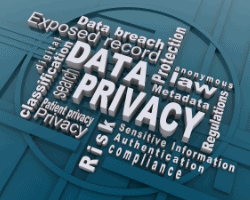
Digitalization is, not surprisingly, driving up user data privacy concerns. Business need to take protective actions or regulators will step in. Increasingly, users are taking steps to control their own data.
How does WhatsApp make money? Most of us have locked horns with the revenue model behind most internet services happily allowing us to use their space for driving borderless communications. After a decade full of technology innovations, it is finally revealed that tech software and even hardware manufacturers sell our data to advertisers. What most of us still don’t know is the degree to which our privacy is under threat. So if you thought that only the website browsing activity was public, wake up!
In a survey by Pew Research, 62% of Americans feared that routine life was not possible without certain companies tracing them.
See also: Balancing the Utility of Process Mining and Privacy Rights
Whatever goes on the web stays there forever
Your full name, phone number, pictures, emails, or any information that you digitize is of value to any advertiser out there. Even if you have set the access settings to ‘private’, your certain contacts may not see it but the platform can. Regardless of your consent, personal information is allegedly exposed to many agencies.
Most internet services are free because the users are the product. It is our personal and professional data that is at trade with other service providers. The primary source of revenue for internet service providers is selling our activity information to advertisers. From the product page on Facebook (or any other public forum) that you stayed on the longest to the frequent use of certain words, everything is tracked and up for sale.
It is appalling to realize how much Google and Facebook know about us. You may have forgotten your favorite café you checked in but they haven’t. Just check your Google and Facebook Ad settings where your personal information is populated by default.
Moreover, e-commerce platforms such as eBay and Amazon are potential threats since they own our banking information. Despite ‘end-to-end encryption’ claims, our credit card published on auto-fill forms should be alarming.
Too much data flowing everywhere, more entry point for hackers
As per a report from the Federal Trade Commission, less than 10,000 households (and not enterprises) could generate 150 million data points every day. With the onset of contemporary technologies such as IoT and Cloud, we are unknowingly storing our private data in hundreds of devices.
So a simple form that you filled via the web browser travels through a series of networks. As the infrastructure to produce, store, and process mountainous data is readily available, the risks attached due to exposure will propel. Consequentially, more number of entry points tempt hackers to infiltrate.
We are all guilty of it. Imagine the number of times you surpassed the Terms & Conditions page. Companies trapped us by deliberately publishing legal contracts that we don’t understand so that surpassing them without reading comes easier.
There are two sets of users – one those who had no idea about the risks and others who can’t resist the temptation to try the latest app despite privacy concerns.
Protecting yourself
We are all digitized and it’s hard to escape the web. The idea is to control the amount of data we produce and follow all privacy protocols. No matter it is the responsibility of companies to use our data responsibly, but it is also our accountability to use the services wisely. Besides changing your passwords for all devices and platforms, here’s more that you should be doing –
Follow a lean publishing practice
Don’t publish without any purpose. Get rid of the habit to upload hundreds of pictures or videos in real-time (such as social media stories, public place check-ins, etc.). Unless you are running a business account, post less private information.
Switch off all devices when not in use
Someone once joked about Alexa or Google secretly listening to private conversations even when they were commanded to shut down. Take it seriously and make sure all the devices connected to the web are completely switched off when not in use.
VPN adoption on the rise – Make use of it
Since VPN provides a gateway to access data prohibited in your region, they come with undeniable security and privacy risks. Make it a point to use reputed VPN services that don’t track your activity.
According to the recent research from a next-gen VPN service provider, Switcherry VPN reveals that the WFH culture is on priority either in SMEs or corporate amid an on-going pandemic. Employees are working remotely, resulting in sophisticated threats related to severe security breaches, hacks, and ransomware. From Big Tech companies to Universities to Healthcare sectors – approx. 267 million data breaches were recorded in September 2020 alone.
To combat such attacks, users are more interested in highly secured VPN services that help them mask the data across all devices and facilitate a secured working zone. The study further reveals a massive spike in the global VPN downloads around September; it may be due to extended WFH policies and fast digitization, causing serious concern for users’ online security.
Avoid malicious browser extensions
Your web browser extension may be a nightmare for your online privacy and poise to a significant cybersecurity attack. It could function as a keylogger to steal your personal data, passwords, and credit card details. If your extensions ask permission to scan, read, or write an email, it could be extremely dangerous indications of future security concerns. Users should be more cautious while enabling extensions on Google Chrome or Microsoft edge as these modern browsers give developers the right to ask users permissions.
As far as measures are concerned, a breakthrough came after the reformed GDPR guidelines from the European Union. In a move to safeguard the privacy of citizen data, Google was fined €50m for processing personal data for ads. Not to miss, the infamous Facebook – Cambridge Analytica Scandal was an eye-opener about the underlying data harvesting practice.
Transitioning from just users to smart users
Technology is outpacing our ability to understand its long term impact. It is scary to realize that someone else is setting the narrative for us. Going forward, more than the service providers, it is the users who have to stay cautious and not fall prey to the swanky world of the web. And the only effective way would be to get smarter and filter choices while picking apps and products.




























